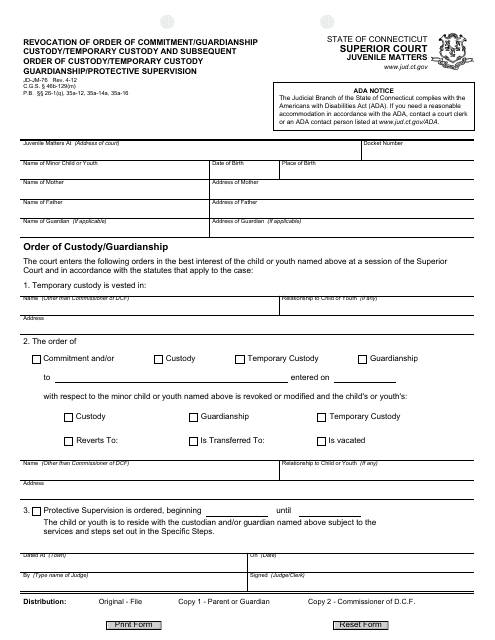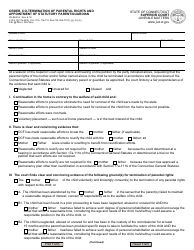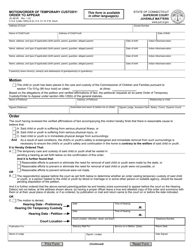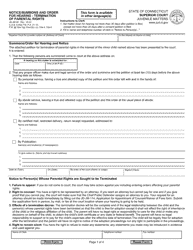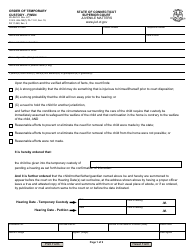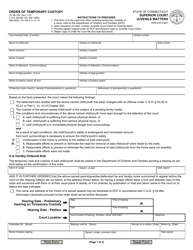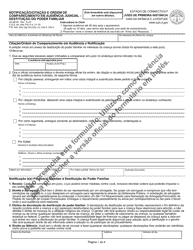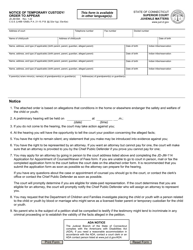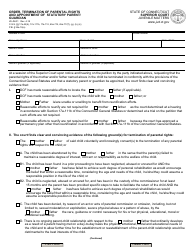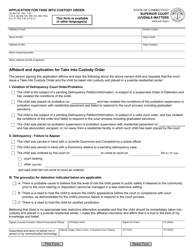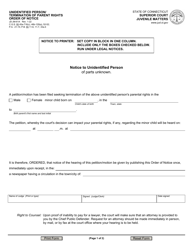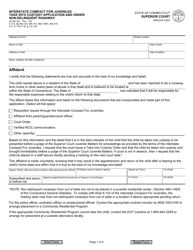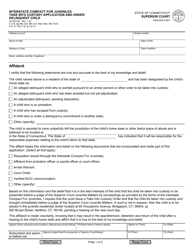Form JD-JM-76 Revocation of Order of Commitment / Guardianship Custody / Temporary Custody and Subsequent Orderof Custody / Temporary Custody Guardianship / Protective Supervision - Connecticut
What Is Form JD-JM-76?
This is a legal form that was released by the Connecticut Superior Court - a government authority operating within Connecticut. As of today, no separate filing guidelines for the form are provided by the issuing department.
FAQ
Q: What is JD-JM-76?
A: JD-JM-76 is a Revocation of Order of Commitment/Guardianship Custody/Temporary Custody and Subsequent Order of Custody/Temporary Custody Guardianship/Protective Supervision form in Connecticut.
Q: What does JD-JM-76 form do?
A: JD-JM-76 form is used to revoke an existing order of commitment, guardianship custody, temporary custody, or protective supervision in Connecticut.
Q: When should I use JD-JM-76 form?
A: You should use JD-JM-76 form when you want to revoke an existing order of commitment, guardianship custody, temporary custody, or protective supervision in Connecticut.
Q: Do I need a lawyer to fill out JD-JM-76 form?
A: While it is not required to have a lawyer, seeking legal advice is recommended to ensure the proper completion of the form.
Q: Is there a fee for filing JD-JM-76 form?
A: There may be a filing fee associated with JD-JM-76 form. The fee varies depending on the court and the specific circumstances. It is best to check with the local Superior Court for the applicable fee.
Q: What information is required in JD-JM-76 form?
A: JD-JM-76 form requires information such as the case number, names of the parties, and the specific order to be revoked.
Q: Can JD-JM-76 form be used for any type of revocation?
A: JD-JM-76 form is specifically designed for revoking orders of commitment, guardianship custody, temporary custody, and protective supervision. It may not be suitable for other types of revocations.
Q: What happens after I file JD-JM-76 form?
A: After filing JD-JM-76 form, the court will review the request for revocation. If approved, a subsequent order will be issued to reflect the change in custody or supervision arrangement.
Form Details:
- Released on April 1, 2012;
- The latest edition provided by the Connecticut Superior Court;
- Easy to use and ready to print;
- Quick to customize;
- Compatible with most PDF-viewing applications;
- Fill out the form in our online filing application.
Download a fillable version of Form JD-JM-76 by clicking the link below or browse more documents and templates provided by the Connecticut Superior Court.
